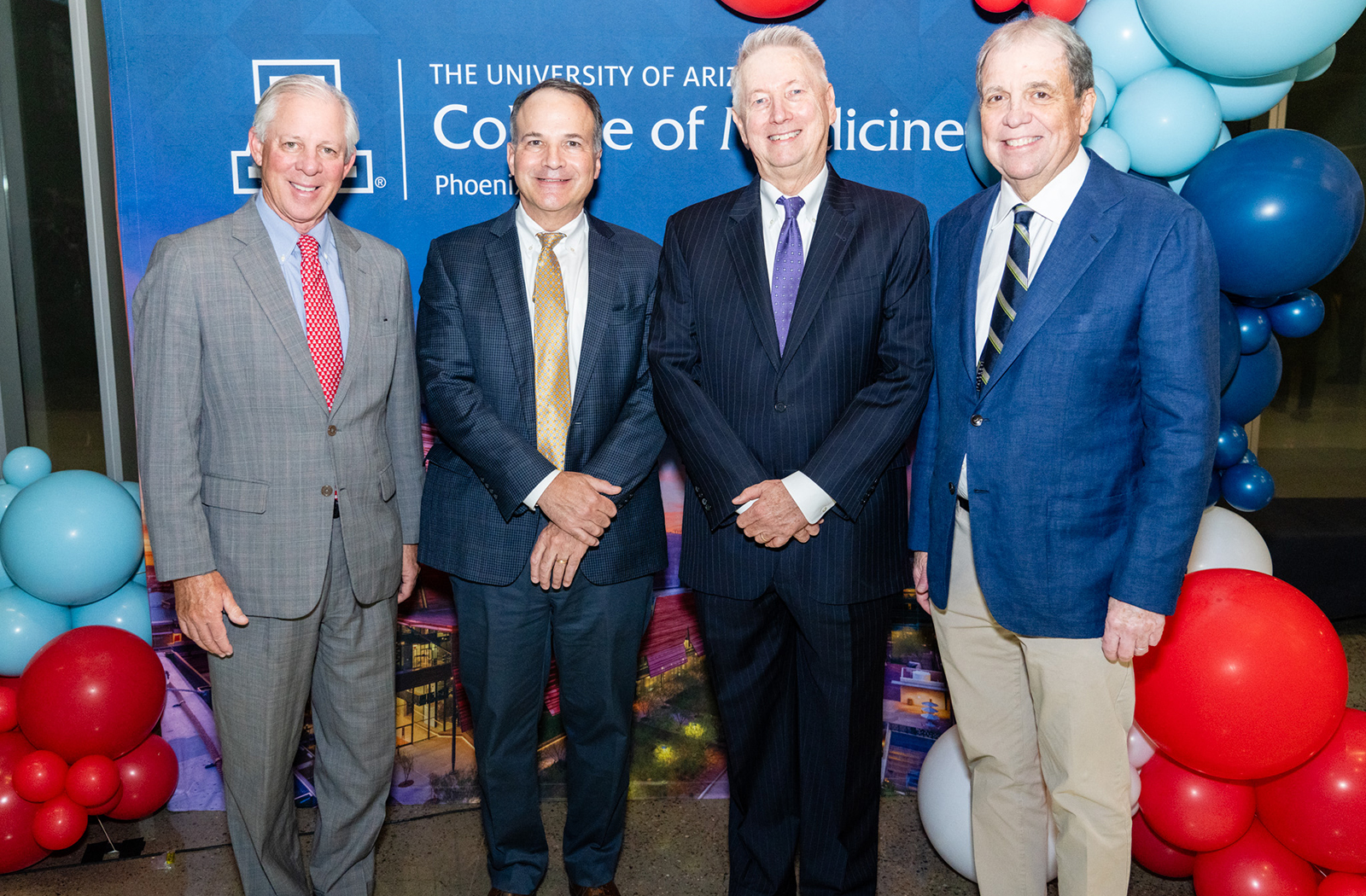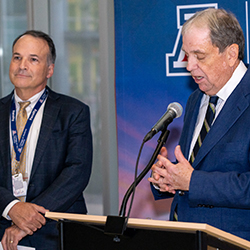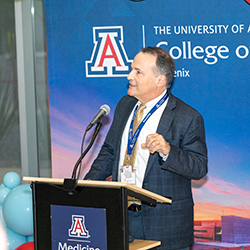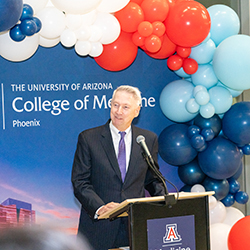
College Sets New Course as Dean Wondisford is Officially Welcomed


Michael Dake MD, senior vice president of Health Sciences, shared insight into the process of selecting the right person to lead the college. “When we embarked on the search for our new dean of the college, we gave a great deal of consideration to the growth not just of this college, but the growth of the entire health sciences enterprise in Phoenix,” he said. “Dr. Wondisford’s background is academic medicine, clinical integration and research growth. It made him a natural fit to lead the College of Medicine – Phoenix,” steering it into its next era.
The tremendous potential for the college and Phoenix was echoed by Robert C. Robbins, MD, president of the University of Arizona. “I think it's an incredibly exciting time for Phoenix and all the things that can be done, not only here with Banner, but with many other partners all over the state,” he said.
He further highlighted the promise by noting the University of Arizona and the College of Medicine – Phoenix’s focus to develop innovative research facilities, including the upcoming Center for Advanced Molecular and Immunological Therapies.
The vast potential for the college to influence the future of medicine drew Dean Wondisford to the role.

To do so, he laid out some guiding principles, all centering around the letter R. “The first thing that we want to do is really make sure our relationships are strong. After that, we need to reorganize. In a sense, we need to become a little bit more of an agile organization, because we are now going to undertake a new inflection of growth,” he said.
He continued, “We need to grow our research portfolio. That's something that's going to be really important; and that's going to require recruitment.” And lastly, he noted that, “We want our school to be representative and respectful of the people not only in Phoenix, but also in greater Arizona.” By doing so, the reputation of the college will further develop, strengthening its central mission.
Dean Wondisford’s vision for the college is an ambitious one, but it builds upon the strong foundation set by his predecessor Guy Reed, MD, MS.
Dr. Reed’s leadership during his six-year tenure as dean was also honored. He will remain with the college as a professor of Internal Medicine and is further developing his lab's work on groundbreaking therapeutics for pulmonary embolism and stroke — which has just entered Phase II clinical trials.
Dr. Reed oversaw tremendous advancement in several key areas of the college’s strategic initiatives. His leadership helped to enhance the infrastructure of research and clinical programs; to recruit distinguished leaders from diverse specialties to serve as department chairs, division chiefs and research directors; to ensure the college exceeded the requirements to maintain full accreditation; to expand the college’s class sizes from 80 to 120 medical students; to broaden the Graduate Medical Education opportunities offered; and much more.

Dr. Reed took time to thank all those who were instrumental in helping him to further the college’s initiatives during his tenure as dean. “There is no way to adequately express my gratitude to you. To everything, there is a season and a time, and this is the season for me to return to my previous passion and love of being a physician scientist,” he said.
Fittingly, Dr. Dake announced he would become the college’s first Dean Emeritus — a distinction that will be immortalized on the college’s Wall of Honor on the third floor of the Health Sciences Education Building.
Topics
About the College
Founded in 2007, the University of Arizona College of Medicine – Phoenix inspires and trains exemplary physicians, scientists and leaders to advance its core missions in education, research, clinical care and service to communities across Arizona. The college’s strength lies in our collaborations and partnerships with clinical affiliates, community organizations and industry sponsors. With our primary affiliate, Banner Health, we are recognized as the premier academic medical center in Phoenix. As an anchor institution of the Phoenix Bioscience Core, the college is home to signature research programs in neurosciences, cardiopulmonary diseases, immunology, informatics and metabolism. These focus areas uniquely position us to drive biomedical research and bolster economic development in the region.
As an urban institution with strong roots in rural and tribal health, the college has graduated more than 1,000 physicians and matriculates 130 students each year. Greater than 60% of matriculating students are from Arizona and many continue training at our GME sponsored residency programs, ultimately pursuing local academic and community-based opportunities. While our traditional four-year program continues to thrive, we will launch our recently approved accelerated three-year medical student curriculum with exclusive focus on primary care. This program is designed to further enhance workforce retention needs across Arizona.
The college has embarked on our strategic plan for 2025 to 2030. Learn more.